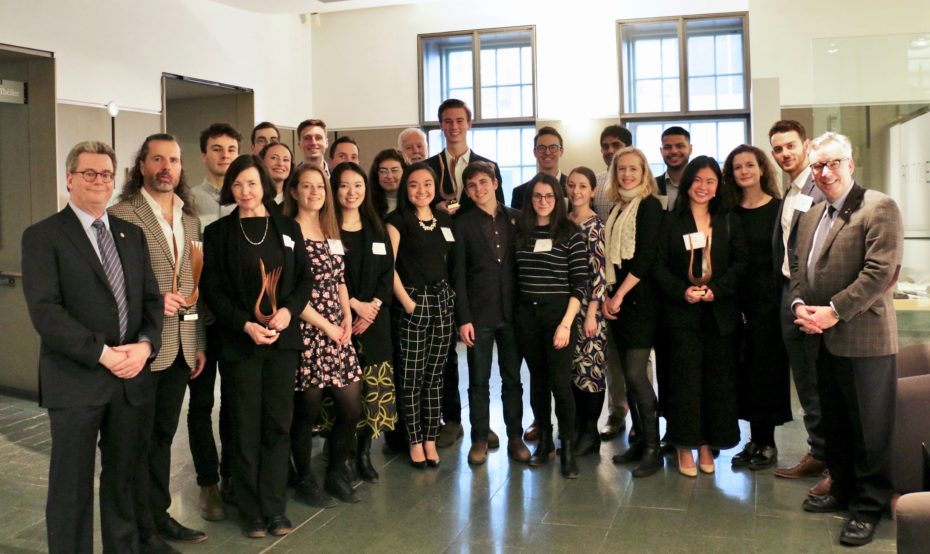
More than 100 members of the McGill community gathered to celebrate the ninth annual Catalyst Awards Gala on Monday, April 1 at the McCord Museum.
First hosted by the McGill Office of Sustainability in 2011, the Catalyst Awards recognize the sustainability initiatives led by students, staff and faculty for their diverse efforts that allow McGill’s campus to flourish.
“From the research questions we ask, to the food we serve in our dining halls, the principles of sustainability guide everything we do at McGill,” said Vice President of Administration and Finance, Yves Beauchamp at the Gala, emphasizing the university’s commitment to sustainability.
Gala goes green
In welcoming attendees to the event, Francois Miller, Director of the McGill Office of Sustainability, also highlighted the work that was done to ensure the Gala was as sustainable as possible. The event had received a Gold certification through the Sustainable Events certification program.
Through the certification, the Office of Sustainability committed to calculating and offsetting the emissions related to travel to the event. As the 113 participants arrived at the Gala Monday evening, they input how they arrived on campus that day and how far they travelled into the new Mc3Gill Carbon Calculator. Using that data, the Office of Sustainability will be to offset the roughly 72 kilograms of CO2e emitted by the participants as they made their way to the gala.
Sustainable projects
The first award of the night was the Research and Education award given to the McGill Sustainability Systems Initiative (MSSI). The award recognizes a project that encompasses original research from the McGill community and focuses on student, staff, faculty and institutional learning.
The McGill Sustainability Systems Initiative fosters interdisciplinary connections that advance McGill’s capacity for sustainability research. Committed to bringing together faculty, researchers, students and staff, MSSI has created a new database that highlights collaborations across departments and associate researchers with the UN Sustainable Development Goals. The MSSI has also held Speaker Series, workshops and consultations that have catalyzed collaboration between faculties and focused on involving faculties with lower past representation.
The Desautels Sustainability Network (DSN) was presented with the Connectivity, Governance & Administration award, which recognizes projects that emphasize the need for strong connections within communities and address how the university is managed in terms of people, funding, decision-making and process implementation.
As a 70 per cent student-led group, the Desautels Sustainability Network held multiple events, such as a Finance & Sustainability Seminar and Career Paths in Sustainable Business Conference, to promote a culture of sustainability throughout the Bachelor of Commerce program and network with sustainable businesses around Montreal. Their first five events were attended by over 500 people and the group plans to host a Summit on Sustainable Business conference as a joint-event with other Montreal universities in the future.
Next, MealCare was recognized with the Catalyst Award for Operations for encompassing the physical activities that support the ongoing function of the University.
Founded by two McGill students, Milton Calderon Donefer and Sanchit Gupta, MealCare diverts surplus, edible food away from the landfill by having student volunteers redistribute hundreds of surplus meals from dining halls and SNAX to locals homeless shelters and soup kitchens. In the past year and a half, MealCare has diverted over 2,650 pounds of food from becoming waste. MealCare aims to consistently communicate food waste data to their food vendor partners and allow their McGill partners to further work to reduce their food waste.
Individual awards
The Catalyst Award for Staff Contribution to Sustainability recognizes an individual who has inspired real, sustainable changes on the University campuses. This year’s recipient is Angelo Battista who serves as the Assistant Manager of Facilities at Athletics & Recreation.
Battista has continually advocated for and been proactive in installing sustainable features in the Athletics facility such as LED light fixtures and more communal study areas. He has also spearheaded the creation of a sustainability action plan for Athletics and Recreation and submitted two successful SPF applications: one for a sustainability intern at Athletics, and one for electric grounds vehicles for the stadium. As echoed by many of his colleagues, Battista makes things happen and will always hear out an idea or proposal to see what can be accomplished.
After receiving a large number of nominations, the Emerald Key Award was awarded to Julien Tremblay Gravel, a third year law student. The Emerald Key Award goes to a student who has made significant and lasting contributions in creating a culture of sustainability at McGill.
Tremblay Gravel lead the creation of the 2018 Trash2Treasure project which diverted five tons of student household items from landfill during the move-out period in Milton-Parc neighbourhood. He also spearheaded a study of the Faculty of Law’s environmental impacts and the creation of a faculty sustainability committee. Tremblay Gravel has additionally served as a research assistant on the Myko application and assisted in creating a platform through which the McGill community can keep track of and be held to their sustainability commitments.
The final individual recognized was George McCourt, who was presented with the Distinguished Contribution Award. This award recognizes an administrative or academic staff member who has demonstrated a commitment towards advancing sustainability in the larger McGill community.
McCourt is a senior faculty lecturer at the McGill School of Environment and has served as an original member of the Sustainability Projects Fund working group. He has provided guidance to many applied student research projects and integrated investigating on-campus sustainability case studies into course curriculums. Along with being well-known for bringing humour and unique perspectives to teaching, McCourt has been recognized in the past with accolades such as the 2007 Principal’s Award for Excellence in Teaching, the 2013 Faculty of Agriculture and Environmental Science Outstanding Teaching Award, and the 2013 Catalyst Award for Staff Contribution to Sustainability.
